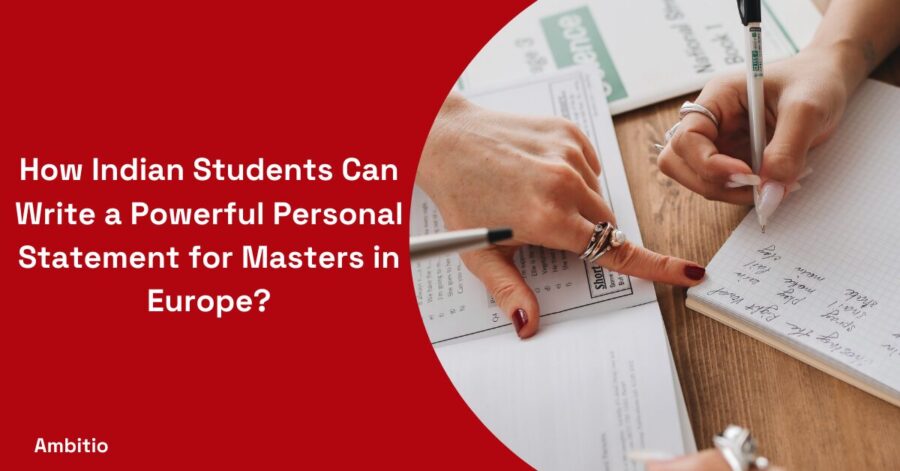15 April 2025
7 minutes read
How Indian Students Can Write a Powerful Personal Statement for Masters in Europe?

Key Takeaways:
- Personal statement for masters in Europe is essential for standing out; tailor it to each university and highlight your passion, academic background, and career goals.
- Research the course thoroughly and align your experiences with the programme’s objectives to demonstrate your fit.
- Focus on clear, concise writing, avoiding unnecessary details, and follow top tips to make your statement impactful.
Did you know that a well-crafted personal statement can make or break your postgraduate application? In fact, admissions tutors spend less than 10 minutes reading each statement, so you need to stand out quickly. But most Indian students struggle with this critical piece of writing, they either repeat generic information or fail to highlight why they’re the best fit for the programme.
To write your personal statement for masters in Europe, you need to go beyond a mere summary of your academic and work experience. Instead, focus on demonstrating your passion for the subject, your career aspirations, and why this specific course is right for you.
Why a Personal Statement is Crucial for Indian Students Applying to Masters in Europe?
Your personal statement for masters in Europe is more than just a formality, it’s your chance to demonstrate why you’re the perfect fit for the programme you want to study. Admissions teams look for students who not only meet course requirements but also show genuine passion and drive. A well-written statement can help you stand out from the crowd and give your application the edge it needs.

By carefully planning your personal statement, you can highlight your academic background, relevant work experience, and future career goals. It’s an opportunity to show how your experiences and knowledge align with the course content, helping you achieve success in your master’s programme.
Essential Elements to Include in Your Personal Statements for Postgraduate Studies in Europe
A personal statement for masters in Europe is your opportunity to showcase why you’re the best candidate for the programme you’re applying to. It’s not just a chance to talk about your academic journey; it’s also a platform for demonstrating your passion, skills, and future ambitions.

Below are the essential elements you must include to create a compelling and effective personal statement:
1. Introduction and Motivation
Start a personal statement by explaining why you want to study the course and why it aligns with your career aspirations. Your personal statement is your opportunity to show that you’re genuinely interested in the programme you’re applying for. Be sure to highlight why this particular degree fits your future career goals and how it will help you build your knowledge in this area.
2. Academic Background
Highlight your undergraduate study, academic achievements, and any relevant skills or knowledge gained during your studies. This section will demonstrate your ability to succeed in the masters courses and give the admissions team an overview of your academic and employment background. Show how your degree has prepared you for the challenges of postgraduate studies and how it complements the course content.
3. Relevant Work Experience
Include any work experience, internships, or voluntary roles that are pertinent to the programme. This part of your application allows you to demonstrate how your past experiences have prepared you for postgraduate studies. Whether it’s a summer internship, part-time job, or relevant volunteer work, showcasing your skills and knowledge in a professional setting can strengthen your application and make your personal statement stand out.
4. Personal Experiences and Skills
Your personal statement and take should reflect the full range of your experiences, including extracurricular activities such as clubs or societies. This section gives you the chance to show leadership, teamwork, and other transferable skills. These personal experiences can add depth to your application and allow you to stand out from the crowd by showcasing how you’ve developed both academically and personally.
5. Career Goals and Future Aspirations
Conclude by explaining how the programme will help you achieve your long-term career goals. This section is your chance to demonstrate a clear vision for the future. Be sure to explain why the course fits into your career path and how the knowledge and skills gained will lead you to apply what you’ve learned in a real-world context. Align your future career plans with the course content, showing how it will help you make meaningful contributions to the field.
By incorporating these essential elements, you’ll create a personal statement that’s not just a piece of writing that you submit — it’s your chance to make your application stand out. Be sure to read your personal statement and revise it carefully to strengthen your application. If you’ve already written a personal statement or look at some examples, refine it based on the guidelines provided for each course application. A good personal statement should demonstrate your academic interests, knowledge in the subject, and the passion to succeed in your postgraduate studies.
How to Personalize Your Postgraduate Personal Statement for Different European Universities?
Writing a personal statement for masters in Europe is an essential part of your postgraduate application, but to truly stand out, personalization is key. As an Indian student, tailoring your personal statement to fit each university’s specific programme requirements is critical.

Here’s how you can ensure your personal statement aligns with the values and expectations of each university:
- Research the Course and University
Before you start writing your personal statement, take the time to research the course content, specializations, and the overall ethos of the university. Understand what makes each programme unique and highlight how your academic background and career goals align with their offerings. - Address the University’s Specific Requirements
Some universities may have unique criteria for applicants. Check the application guidelines thoroughly and make sure your personal statement addresses those specific needs. You can also demonstrate knowledge of the course pages and tailor your personal statement to reflect how you fit those requirements. - Link Your Personal Experiences to the Programme
Your undergraduate degree and work experience are key elements of your personal statement. Draw connections between your academic journey, professional background, and the specific course you’re applying for. Mention how the programme will help you build on your relevant skills and achieve your long-term career goals. - Show Your Interest in the Subject
Each university will have its own approach to teaching and research. In your personal statement, emphasize your interest in the subject area and explain why the university’s approach is the best fit for you. This shows the admissions team that you’ve thoroughly considered your application and are passionate about what they offer. - Use Personal Statement Examples for Inspiration
While writing your personal statement, refer to personal statement examples that fit the university you are applying to. These examples can provide guidance, but ensure that your statement is original and reflects your unique experiences and motivations.
By customizing each personal statement for the specific programme, you ensure that your application resonates with the admissions team, making your statement stand out among other postgraduate students.
Common Pitfalls to Avoid by Indian students in Personal Statement for Masters in Europe
Writing a personal statement for masters in Europe is a critical step in the application process, but many Indian students fall into certain pitfalls that can hurt their chances. Avoiding these mistakes can help you submit a good personal statement that stands out. Here are some common errors to steer clear of:
- Failing to Tailor Your Statement
One of the biggest mistakes is using a generic personal statement template for all your applications. While it’s tempting to use a one-size-fits-all approach, each programme and university has unique values and expectations. Be sure to customize your statement of purpose for each master’s course by showing how your academic background, relevant experience, and career goals align with the programme. - Overloading with Autobiographical Information
While it’s important to mention your personal experiences, overloading your personal statement with autobiographical details that are not relevant to the course can dilute your message. Focus on how your experiences, such as your undergraduate studies, academic achievements, work experience, and clubs or societies you were part of, have prepared you for this master’s programme. - Ignoring Word Count and Structure
A good personal statement should be concise, typically around 500 words. Many students write a lengthy personal statement that fails to stay within the required word count. Overwriting may cause the admissions team to lose interest, so give yourself plenty of time to edit and ensure your statement stays focused and within guidelines. - Lack of Clear Structure and Opening Lines
The opening paragraph of your personal statement is your chance to make a first impression, so don’t waste it. Many Indian students fail to hook the reader with an engaging opening. Start with something compelling that draws attention to your academic interests and why you want to study the course. Ensure that the rest of your statement flows logically, demonstrating your knowledge and skills. - Neglecting to Highlight the Fit for the Programme
Admissions tutors look for applicants who have a clear understanding of the course and why it’s the right fit for them. Avoid vague statements that don’t explain why you want to study the specific programme. Research the course, demonstrate your knowledge, and clearly state how the course will help you achieve your career goals.
By following these tips, you can strengthen your personal statement and avoid common pitfalls. A well-crafted statement of purpose, with relevant experience and personal insights, will give your application the edge it needs.
10 Top Universities in Europe to study Masters for Indian students
Europe has long been a destination of choice for international students, particularly from India, seeking to pursue postgraduate studies. The continent is home to some of the world’s top universities, offering a diverse range of master’s courses with cutting-edge research opportunities and excellent career prospects.
For Indian students, studying in Europe is an opportunity to experience different cultures, gain global exposure, and develop the knowledge and skills needed for a successful career. Below are 10 top universities in Europe for Indian students to study a master’s degree:
| University | Average Tuition Fees (EUR/year) | Average Salary After Graduation (EUR/year) | Exams Required |
|---|---|---|---|
| University of Oxford (UK) | 20,000 – 30,000 | 40,000 – 60,000 | GRE, IELTS/TOEFL |
| University of Cambridge (UK) | 20,000 – 30,000 | 38,000 – 55,000 | GRE, IELTS/TOEFL |
| ETH Zurich (Switzerland) | 1,500 – 5,000 | 80,000 – 100,000 | GRE, IELTS/TOEFL |
| LMU Munich (Germany) | 1,000 – 2,000 | 40,000 – 60,000 | GRE, IELTS/TOEFL |
| Imperial College London (UK) | 25,000 – 40,000 | 50,000 – 70,000 | GRE, IELTS/TOEFL |
| Université PSL (France) | 15,000 – 20,000 | 45,000 – 55,000 | GRE, IELTS/TOEFL |
| Delft University of Technology (Netherlands) | 15,000 – 20,000 | 50,000 – 65,000 | GRE, IELTS/TOEFL |
| ETH Lausanne (Switzerland) | 1,000 – 2,000 | 70,000 – 90,000 | GRE, IELTS/TOEFL |
| University of Amsterdam (Netherlands) | 10,000 – 20,000 | 45,000 – 60,000 | GRE, IELTS/TOEFL |
| Università Bocconi (Italy) | 10,000 – 20,000 | 45,000 – 60,000 | GRE, IELTS/TOEFL |
Conclusion
Your personal statement for masters in Europe is your opportunity to make a lasting impression on the admissions team. It’s essential to ensure your personal statement aligns with the specific course requirements and highlights your academic and professional journey. For Indian students, crafting a compelling personal statement may be challenging, but with the right approach, focusing on your passion, career goals, and how the programme fits your aspirations, you can stand out. Remember to focus on your written communication skills and follow top tips when writing.
Whether you’re starting from scratch or refining your undergraduate personal statement, Ambitio is here to help. Our experts can guide you in creating a strong personal statement that strengthens your application. Submit your application today!
FAQs
What is a personal statement for a master’s application?
A personal statement is a document that introduces you to the admissions committee and explains your motivation for applying to a master’s programme.
What should I include in my personal statement?
Include your reasons for applying, relevant experience, skills, and how the programme aligns with your career goals.
How long should my personal statement be?
Typically, it should be around 500–700 words, but check the specific guidelines for each institution.
How should I structure my personal statement?
Use a clear structure: introduction, main body discussing your background and skills, and a conclusion summarizing your suitability.
Should I address weaknesses or gaps in my application?
Yes, briefly address any weaknesses or gaps, explaining the circumstances and what you learned from them.
Can I use the same personal statement for multiple applications?
No, tailor each statement to the specific course and university to show why you’re a good fit.
What are common mistakes to avoid?
Avoid clichés, exceeding word limits, and failing to proofread for errors.

You can study at top universities worldwide!
Get expert tips and tricks to get into top universities with a free expert session.
Book Your Free 30-Minute Session Now! Book a call now




























